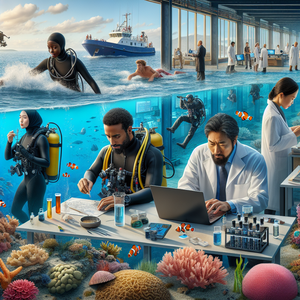The Science and Soul of Whale Songs

When you imagine a scientist at work, the image of someone bent over a lab bench surrounded by microscopes and computers may come to mind. But for this marine biologist, the stage is far from sterile—it is vast, blue, and alive with the songs of whales. Their journey to understand these complex vocalizations is as much about emotional resonance as it is about scientific rigor. By treating whale songs as a sophisticated form of communication, they have uncovered groundbreaking insights into the lives of these majestic creatures. However, this biologist’s passion does not stop at research. Their lifestyle reflects a commitment to living in harmony with nature, rejecting unnecessary modern conveniences like microwaves to embrace simplicity and sustainability. It’s a life inspired by the rhythms of the ocean, a life that reminds us that science and empathy are not only compatible but essential for meaningful conservation.
The Science of Whale Songs
Whale songs are some of the most intricate and captivating sounds in the animal kingdom. Male humpback whales, for instance, produce complex melodies that can last for hours and travel for thousands of miles through the ocean. These songs are not merely random sounds; they serve critical functions, including mating, communication, and navigation. Understanding these vocalizations requires advanced technology, such as hydrophones and acoustic analysis software, but also a profound connection to the animals themselves. This marine biologist has spent years studying whale songs, combining technology with fieldwork and an astonishing technique—vocal mimicry. By imitating whale sounds, they have managed to engage with these creatures in ways that are both groundbreaking and deeply moving. Their work has led to remarkable discoveries, such as the identification of regional “dialects” in whale songs, which suggests that different populations of whales develop unique cultural identities. They’ve also uncovered how whales use their songs to communicate during migration, coordinating their movements across vast distances. Perhaps most importantly, they’ve used their research to monitor endangered species, identifying their presence in specific regions by “listening” to the ocean. This work has provided critical data for conservation efforts, offering hope in the face of threats like climate change, pollution, and habitat destruction.
The Soul of Whale Songs
While the scientific importance of whale songs is immense, their emotional and spiritual significance is equally profound. To hear a whale sing is to feel connected to something far greater than oneself—a reminder of the beauty and fragility of life on Earth. For this marine biologist, each song is a testament to the intelligence and vulnerability of these creatures, sparking both awe and a sense of responsibility. Their encounters with whales have profoundly shaped their worldview, inspiring them to become an advocate for ocean preservation. At conferences, public lectures, and community events, they share not only their research but also the emotional impact of their work. Audiences leave not just informed but deeply moved, inspired to take action to protect the marine ecosystems that are so vital to life on Earth.
Living in Harmony with Nature
This marine biologist’s commitment to nature extends far beyond their professional work. Their personal life is an extension of their values, built around sustainability, simplicity, and mindfulness. One of their most unique lifestyle choices is their refusal to use microwaves—a decision that might seem trivial but carries profound meaning. For them, avoiding microwaves is part of a broader philosophy of intentional living. It’s about slowing down, embracing natural rhythms, and rejecting the convenience-driven mindset that often leads to environmental harm. Their home reflects these principles, filled with natural materials, handcrafted items, and a sense of deliberate simplicity. They source their diet sustainably, prioritizing local and organic foods, and strive to reduce their ecological footprint in every aspect of their life. Much like the whales they study, they have adopted a rhythm of life that emphasizes connection over convenience. Their lifestyle serves as a powerful reminder that small, individual actions can contribute to a larger movement for environmental preservation.
Bridging the Gap Between Science and Advocacy
What sets this marine biologist apart is their ability to unite rigorous scientific research with heartfelt advocacy. Their work decoding whale songs is not just about understanding these creatures; it’s about protecting them and inspiring others to do the same. By blending data-driven science with emotional storytelling, they have become a powerful voice for marine conservation. Through their efforts, they have reached audiences far beyond the scientific community, inspiring people from all walks of life to reconsider their relationship with the natural world. Their message is clear: to save the oceans, we must first understand and appreciate the creatures that inhabit them.
The story of this marine biologist is a testament to the power of science and empathy to drive meaningful change. By dedicating their life to decoding whale songs and advocating for conservation, they have shown us that understanding the natural world is not enough—we must also protect it. In a world increasingly disconnected from nature, their work serves as a poignant reminder to slow down, listen, and live with intention. The timeless songs of whales call to us across the oceans, urging us to take action—not just to preserve their melodies but to ensure that our planet remains a sanctuary for all life.
Marine Bioacoustician
Research institutions (e.g., Woods Hole Oceanographic Institution), conservation NGOs, and government agencies like NOAA
Responsibilities
Study and analyze marine animal vocalizations, such as whale songs, to understand communication and behavioral patterns.
Use specialized tools like hydrophones and acoustic analysis software to collect and interpret underwater sound data.
Collaborate with marine conservationists to use bioacoustic data for species monitoring and habitat protection.
Required Skills
Expertise in acoustic signal processing and marine biology.
Proficiency in software like Raven Pro, MATLAB, or similar acoustic analysis tools.
Field experience collecting and analyzing sound data in marine environments.
Ocean Conservation Policy Advisor
United Nations Environment Programme (UNEP), World Wildlife Fund (WWF), and governmental bodies
Responsibilities
Develop and advocate for marine conservation policies to protect endangered species and ecosystems.
Analyze scientific data, including whale migration patterns and vocalization studies, to inform regulations.
Collaborate with governments, NGOs, and private stakeholders to implement sustainable marine practices.
Required Skills
Strong understanding of marine law and environmental policies (e.g., the Marine Mammal Protection Act).
Ability to translate scientific findings into actionable policy recommendations.
Excellent communication and negotiation skills for stakeholder engagement.
Wildlife Documentary Producer (Specializing in Marine Life)
National Geographic, BBC Earth, or independent production companies
Responsibilities
Produce and direct documentaries focusing on marine life, such as the communication and behavior of whales.
Partner with marine biologists and underwater cinematographers to capture compelling footage and narratives.
Raise awareness about ocean conservation through storytelling and visual media.
Required Skills
Strong background in filmmaking, with a focus on natural history or wildlife.
Knowledge of marine ecosystems and the ability to collaborate with scientific experts.
Proficiency in video editing, camera operation, and scriptwriting.
Oceanographic Data Scientist
Research labs, tech companies developing ecological AI tools, and marine-focused NGOs
Responsibilities
Analyze large datasets from ocean monitoring systems, including whale acoustic data, to identify ecological patterns.
Develop predictive models for migration, population health, and environmental changes affecting marine species.
Collaborate with interdisciplinary teams, including biologists and conservationists, to inform research and policy.
Required Skills
Expertise in data analysis tools such as Python, R, and GIS software.
Experience working with oceanographic datasets, including acoustic and environmental data.
Advanced degree in data science, oceanography, or a related field.
Marine Ecotourism Guide and Educator
Eco-tourism companies, marine conservation organizations, and national parks
Responsibilities
Lead educational excursions, such as whale-watching tours, to teach participants about marine life and conservation.
Use knowledge of whale behavior and communication to provide meaningful and informative experiences.
Advocate for sustainable tourism practices to minimize human impact on marine ecosystems.
Required Skills
Strong background in marine biology or environmental science.
Excellent public speaking and storytelling skills to engage diverse audiences.
Certification in eco-tourism, boating, or diving (e.g., PADI certification for underwater tours).


